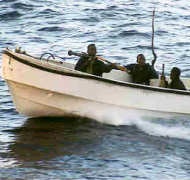
ABOVE: Ron Kuby
Although U.S. and international laws relating to piracy aren’t strictly within the domain of export laws, the issues are of considerable interest to the export community, both legal and otherwise, because of the impact of piracy on export trade from the U.S. and other countries. Also, it’s an interesting subject and allows the occasional lapse into pirate dialect.
The criminal complaint against Abduwali Muse, the pirate involved in the Maersk Alabama affair who has been brought to New York for trial, has been released. The allegations in the complaint, if true, suggest that Muse is not quite the innocent schoolboy duped by older pirates, as claimed by his mother. Rather Muse was the ringleader of the operation although, sadly for him, a devastatingly incompetent one at that.
Muse was among the first of the pirates to board the ship and, brandishing a gun, he started giving orders to stop the ship, lower a ladder to the pirate boat, and to give him a telephone number for the owners of the ship. He also demanded that the rest of the crew, at that point hiding in the safe room, surrender. A ship crew member convinced Muse that the crew would be to afraid to surrender if he was carrying a gun, thereby causing Muse to leave his gun behind as the crew member led him around the ship. Shortly thereafter several crew members tackled Muse, tied him up and carried him down to the safe room. Oops.
Later Muse was released by the crew to board the lifeboat with the Alabama’s captain as part of a deal to have the pirates leave the ship. On the lifeboat, Muse boasted to the Alabama’s captain that he had hijacked other ships. When the naval warship USS Bainbridge arrived on the scene, Muse requested permission to board where he received medical treatment for the wounds he received in the scuffle on the Alabama. When Navy sharpshooters took care of his compatriots on the life boat, Muse’s dreams of coming to America were realized, although not quite in the manner he had perhaps hoped.
The United States’ claim to have the jurisdiction to bring Muse back to the U.S for prosecution is based not only on the US flag status of the Alabama, but also under the principal of universal jurisdiction under the 1958 Convention on the High Seas and the U.N. Convention on the Law of the Sea (“UNCLOS”). (The U.S. is a member of the former, but not the latter, although both have nearly identical provisions permitting universal jurisdiction over pirates.)
Of course, that hasn’t stopped lawyer-turned-radio-host Ron Kuby, who is seeking to defend Muse, from trying to concoct a dubious theory questioning U.S. jurisdiction over Muse.
I think in this particular case, there’s a grave question as to whether America was in violation of principles of truce in warfare on the high seas. This man seemed to come onto the Bainbridge under a flag of truce to negotiate. He was then captured. There is a question whether he is lawfully in American custody and serious questions as to whether he can be prosecuted because of his age.
Presumably this is a reference to Article 32 of the 1907 Hague Convention Respecting the Law and Customs of War on Land (Hague IV), which at least might arguably be said to also state the international law regarding wars at sea. That provision states:
A person is regarded as a parlementaire who has been authorized by one of the belligerents to enter into communication with the other, and who advances bearing a white flag. He has a right to inviolability, as well as the trumpeter, bugler or drummer, the flag-bearer and interpreter who may accompany him.
Even leaving aside the formality of the white flag, and there is no indication that Muse carried one, Hague IV and the international law governing conflicts at sea only applies to nations at war. Historically pirates have been considered hostes humani generis (“enemies of all mankind”) and completely outside protection of maritime law. Conventions relating to the conduct of war by nations have no application to them. Instead, the only protections that pirates have are those set forth in the UNCLOS and the 1958 Convention on the High Seas, both of which give the pirates a right to a trial. (Previously international law permitted summary execution of pirates at sea when caught in the act.)

 Posted by
Posted by  Category:
Category: 

 Private security company Blackwater is, apparently,
Private security company Blackwater is, apparently, 


